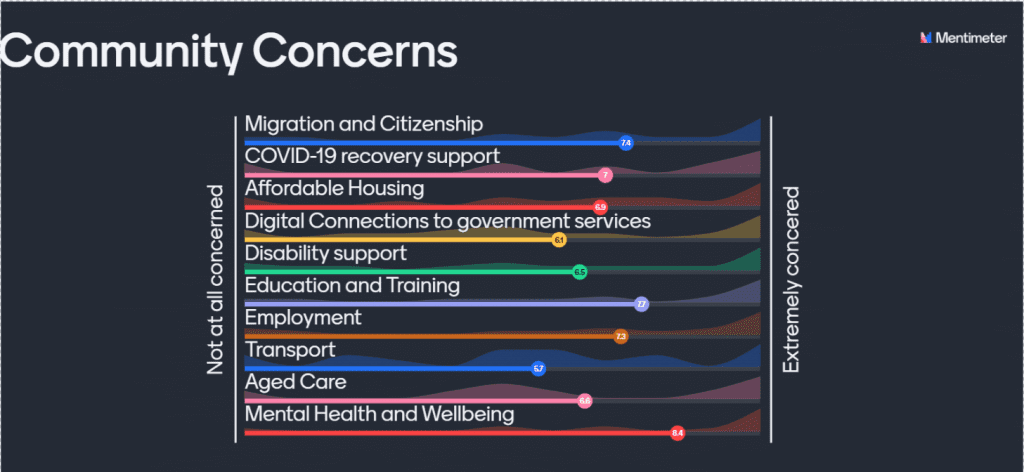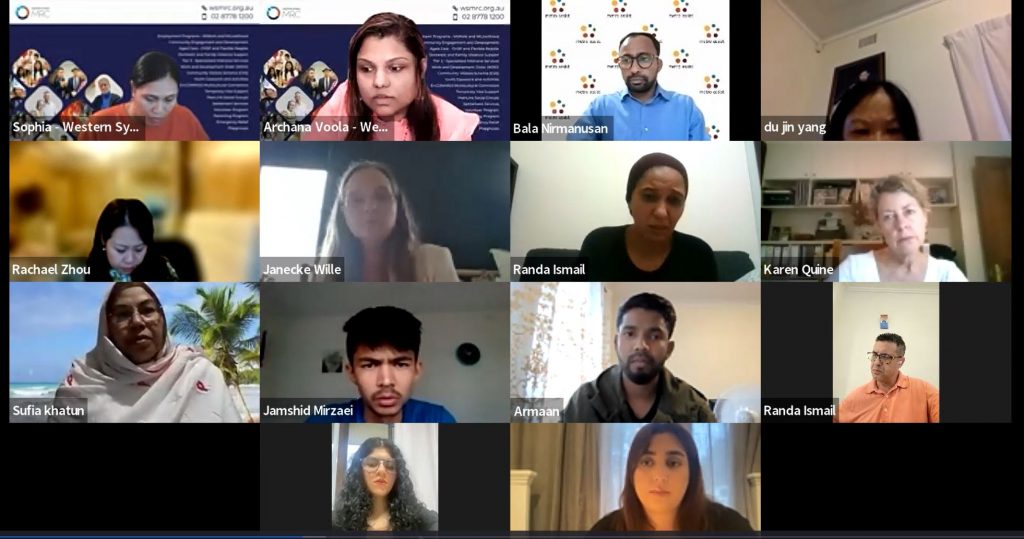
Mr. Bala Nirmanusan & Dr. Archana P. Voola – May 2022.
Taking this responsibility seriously, Western Sydney MRC and Metro Assist partnered to run a Community Consultation Tour for the Culturally and Linguistically Diverse (CALD) communities in Canterbury-Bankstown area on 24th March 2022. Employing a community capacity building approach, the consultation session was held online via zoom to identify key issues as described by the communities as well as provide them with resources such as the Community Civic Participation Toolkit and well as Local Government Areas based snapshots.
During this community consultation session, CALD community members noted feeling overlooked by the government, especially when making national policies. They indicated a lack of trust in government institutions as they remain invisible in government policies at all levels of government. Inclusiveness is a significant component of a vibrant democracy, and it is the responsibility of the relevant stakeholders to address those concerns through authentic community engagements.

Mental health and wellbeing were chosen as the top issue of concern. Research identifies substantial mental health and wellbeing challenges due to pre-migration trauma as well as the stress of settling into a new and unfamiliar host country. Aggravating the situation further is the high cost of specialist services and limited access within the local government areas involved in the consultations. Corroborated by research undertaken during COVD-19, seeking to highlight the lack of access to trauma-informed and culturally competent mental health services in SouthWest Sydney.
A secondary concern was Education & training. For CALD communities, language can be a barrier to engaging in studies or employment. Participants noted that government support often directs new arrivals towards courses and training that they are least interested in. Rather than allowing individuals from refugee and migrant backgrounds to pursue aspirations, they are limited to a set of vocational courses or training options. Additionally, the expensive nature of higher education becomes a barrier for individuals to pursue their dreams.
The third issue of concern was Employment. Participants noted that newly arrived migrants and refugees find it difficult to understand and integrate into the Australian job market. While some lack the required skills, training & experience required by the Australian labour market, others are unable to get their existing overseas skills, qualifications and experiences recognised by employers. Therefore, large numbers of CALD individuals rely on the national employment program Jobactive.

Migration and Citizenship emerged as the fourth issues of concern. The participants noted that CALD communities faced several challenges related to immigration. they cannot sponsor or bring their remaining family members stuck overseas to Australia. Another concern for temporary visa holders is the eligibility for the majority of government benefits and/or services and rely on themselves to find employment & accommodation. This was especially distressing during the COVID-19 related lockdowns when vulnerable individuals were cut off from accessing available NGO support.
Last was the issue of Affordable Housing. Community members noted that securing accommodation within the private rental system is a challenge due to exorbitant related costs. Not all new arrivals meet the eligibility criteria for public housing and the waiting lists are long. Some participants also highlighted that crowded housing was an integral part of the spread of COVID-19 as many newly arrived could not afford appropriate housing, therefore removing the ability to socially distance. They added that safe, affordable housing was a challenge for individuals on temporary or bridging visas, and people seeking asylum.
With the election now over, many communities will be asking – so where to from here?
Transforming the livelihood of people in SouthWest and Western Sydney should be a major priority for leaders, politicians, and policymakers. Given the largest cohort of humanitarian entrants live in SouthWest Sydney, it is important to recognise the unique needs of the residents within the area. The richness, diversity and strengths of these communities are manifold and require a strength-based approach to support and cater to their needs. Some of the key asks from the communities are:
While the world was in chaos, many migrants and refugees arrived in Australia with the hope of building a stronger foundation for a better future. Current leaders and federal candidates running for elections, need to build trust with the CALD community through genuine and meaningful engagement that stands the test of time. These commitments need to be embedded into longer-term policies rather than dictated by the party/politician of the moment. This can be executed through direct community consultations, ad-hoc meetings, online engagement and connecting through migrant resource centres that have the expertise and experience on this front. Identifying, listening and addressing community concerns is a priority.